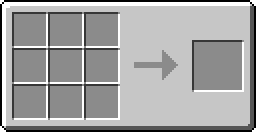EU storage block
An EU storage block, as its name implies, is a block that accepts, stores, and outputs EU. This is accomplished through either in-world cable connections or the block's GUI.
Use and notes[edit]
When placed, a storage block's output face is oriented toward the player. This is indicated by a dot (observe the images in the table below). All other faces can be used for input, so long as no single input exceeds the block's maximum EU/t (based on its power tier). Exceeding this figure will almost certainly result in an explosion; use a transformer of the correct tier to avoid this unfortunate event (or a series thereof).
To reorient a storage block, right-click with a wrench on the face you want to use for output, or shift-right-click to set it as the opposite face.
To remove a storage block, simply wrench the output face (or shift-wrench the face opposite it).
- Storage blocks will only retain 80% of their EU when removed.
Chained storage blocks (i.e. wired to other storage blocks) can be used to avoid cable loss on lengthy transmission lines; however, the material cost of crafting another storage block may well outweigh the extra 1 or 2 EU per packet you would otherwise lose.
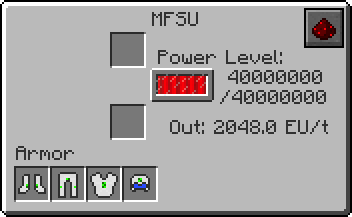
The storage block GUI (example at right) has two slots for items; the top slot is used for charging items from the block's EU storage, the bottom slot for discharging items into the block's EU storage. To the lower left of the main GUI are four slots that show the player's currently worn armor, allowing for quick charging of equipped items without having to remove them beforehand.
The button in the upper right cycles through the available options for the storage block's redstone behavior (though the last two options are output behavior).
- Nothing (default)
- Emit if full
- Emit if partially filled
- Emit if partially filled or empty
- Emit if empty
- Do not output energy
- Do not output energy unless full
IC² currently has four EU storage blocks.
| Description | Recipe | In-game |
|---|---|---|
| BatBox Power tier: 1 (Max I/O 32 EU/t) Capacity: 40K EU Stores more EU than the sum of its components (30K). Before 2.x, used Insulated Copper Cable instead of tin in recipe. |
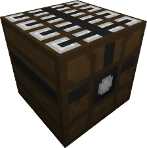
| |
| CESU Power tier: 2 (Max I/O 128 EU/t) Capacity: 300K EU |
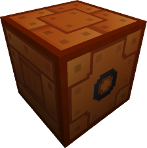
| |
| MFE Power tier: 3 (Max I/O 512 EU/t) Capacity: 4M EU Before 1.97, used Insulated Copper Cable instead of gold in recipe. |
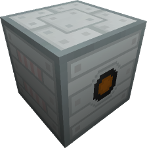
| |
| MFSU Power tier: 4 (Max I/O 2048 EU/t) Capacity: 40M EU Stores less EU than the sum of its components (64M). |
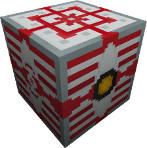
|
HAYO[edit]
Extracted from the old MFE page as-is.
This section is outdated.
This device can do it. Everything.
The MultiFunctionalElectric Transmitter is necessary for any big industrial workspace using cables and current. Why? Let me tell you of the amazing number of uses:
Any cable linked to the side faces of the MFE will transmit energy into it. The MFE itself will as well EMIT energy, through the top and bottom faces.
Even more, the MFE contains an integrated ENERGY STORAGE. Yes, that's right, it can effectively contain an amount of energy, comparable to 60 RE BATTERIES(or 10 Energy Crystals). The MFE will often not emit power if no power is requested of it (for instance, if it is just linked to a machine). However, it is possible to stop the MFE from emitting energy at all by powering it with redstone.
But even better: for the unbelievable case you managed to FULLY LOAD the MFE, it will emit energy (ignoring redstone signals). This was done for the sake of preventing energy from getting wasted in uebercharged MFE 's.
Last but not least, the MFE can act as an energy up- & download station in vast networks. You can pop an empty battery(or an empty Energy Crystal) in the upper slot and it will become charged until it's full or the MFE is out of energy. As well, you can put charged batteries(and charged Energy Crystals)into the lower slot to load up the MFE 's storage. That's technology, isn't it, HAYO!
